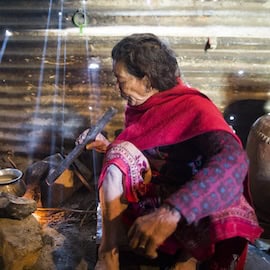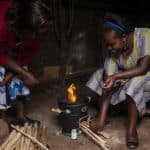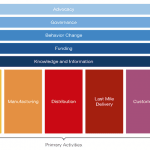Since humankind discovered fire, families have burnt wood to warm themselves and to cook. Yet astonishingly, despite the explosion in the use of oil and gas that started in the 19th century — and more recently nuclear, hydro and other renewables — the use of biomass fuel has remained consistent over the centuries.
In fact, the use of such biomass fuels is even growing. How can this be in 2024?
This extraordinary anomaly is due to the fact that poor families in emerging economies still have to chop down trees to burn wood as their primary source of cooking fuel and warmth. And their continued dependence on this Stone Age fuel source is having a devastating impact on the health of people and the planet.
The household smoke it creates leads to almost 4 million premature deaths each year, making it the third-biggest cause of early mortality for women and children globally, after heart disease and strokes.
Chopping down trees for firewood or charcoal also hurts the environment: The International Energy Agency (IEA) estimates that it causes the deforestation of land the size of Ireland each year.
Uneven Progress in Addressing the Need for Clean Cooking
Due to these issues, the need for clean cooking solutions has become a growing global priority — but progress in addressing this challenge has been uneven.
In Asia, some countries have made progress: For example, across the region some 840 million people have gained access to cleaner ways of cooking since 2010. And China, India and Indonesia have each more than halved the number of people relying on dirty fuels. Others have made less progress. For instance, despite having abundant renewable hydro energy, 51% of the population in Nepal still burn wood as their primary energy source. This issue goes hand-in-hand with energy poverty: The average Nepalese citizen consumes roughly one-fifth of the energy of their Indian neighbours to the south and one-twentieth of the energy of their Chinese neighbours to the north.
Meanwhile, other countries have missed out on this progress entirely. For instance, many countries across Africa have not gained widespread access to cleaner fuels — and even successful efforts to roll out clean cookstoves in the region have been offset by population growth.
The Failure of Clean Cooking Efforts — And Some Funding Solutions
The development sector has been focused on the critical need to give families in emerging economies access to clean cookstoves for decades. So why have its efforts failed to achieve more global progress?
The fact is that clean cooking programmes are woefully underfunded. The IEA estimates that these programmes face a $5.5 billion annual funding gap. And governments and multilateral development banks have never made the issue a real priority. The net result is that the development sector has not been able to fund enough clean cookstoves — and the necessary education and transition programmes — through traditional funding like private donations and government grants.
However, there are other funding solutions, such as providing impact finance to clean cookstove manufacturers and distributors through equity investments or green bonds. Impact finance can subsidise stove costs, making them more affordable to low-income consumers. Another solution involves financing stove distribution to “bottom of the pyramid” consumers through PayGo or microfinance, in order to help families afford cleaner cooking solutions. Cleaner stoves often require less and cheaper fuel, saving families money — which helps them to repay a microloan. And of course, carbon markets can turn cookstoves into a revenue source, supporting cookstove project financing, funding purchase subsidies or subsidising repayments on microloans.
The voluntary carbon market has spurred a gold-rush of investment into clean cookstoves. Around half of carbon projects registered in 2023 were cookstove projects, in which households are provided with free or subsidised cookstoves by project developers in return for the carbon credits generated by their reduced burning of firewood. However, earlier this year the prices of cookstove credits dropped when an article was published in Nature claiming many cookstove projects were over-crediting — i.e., issuing more credits than the amount of emissions reductions they had actually achieved.
This was followed by the news that social impact project developer C-Quest Capital had over-issued millions of credits from its cookstove projects.
Addressing the Evolving Challenges in Clean Cooking
Despite these challenges, there is still demand — and a clear need — for clean cooking. That’s why Save the Children Global Ventures, through our Children’s Impact Investment Fund, has invested in ATEC — a high-integrity innovator and distributor of clean cooking devices. ATEC verifies the carbon impact of its stoves by digitally measuring and recording their usage through a SIM card-enabled stove top. This data is used to more accurately calculate emissions reductions.
Save the Children Global Ventures also launched the Nature-based Solutions for Children initiative to fund development projects through high-integrity participation in carbon markets. Through this initiative, we will leverage nature-based solutions to benefit children and the planet, alongside our continued advocacy for developing urgent and wide-ranging emissions cuts and phasing out the use and subsidy of fossil fuels.
We plan to use carbon credits to fund a variety of projects, including the transition to clean cooking in Nepal, sustainable and climate-resilient shrimp farming through mangrove rehabilitation in Vietnam, and climate-smart agriculture in Kenya.
In these (and other) projects, we’ll support communities’ efforts to generate and sell carbon credits to buyers around the globe, providing them with an ongoing source of income. To that end, we are in discussions with businesses that have demonstrated their commitment to decarbonisation and need to secure credits to offset the emissions that they can’t currently avoid, in order to meet their net-zero targets.
Through these efforts, we plan to demonstrate that financially sustainable and scalable Nature-based Solutions models can be implemented in ways that are locally led, support community development goals, and share benefits fairly with communities.
A key part of our plans includes the development of the Fair Standard to certify credits from projects that treat indigenous peoples and local communities fairly. We developed these standards both for our own internal use and for the use of others operating in the broader carbon credit space. In early 2023, the first certification was issued under the Fair Standard, focusing on credits from the Olkola Ajin Savannah Burning Project in northern Australia. This project has supported the Olkola people’s efforts to restore their country through traditional cultural practices, while reducing carbon emissions through wildfire management. Going forward, we will apply this standard in our other projects and advocate for its broader adoption across the sector.
As the clean cooking industry works to finally end the era of biomass fuel, we must learn from the mistakes of the past — both in carbon credit verification and across the sector more broadly — and we must heed informed criticism. But we must not allow this critical opportunity to fight for children and the planet to be lost.
Paul Ronalds is CEO of Save the Children Global Ventures (SCGV).
Photo courtesy of UN Women/N. Shrestha.



